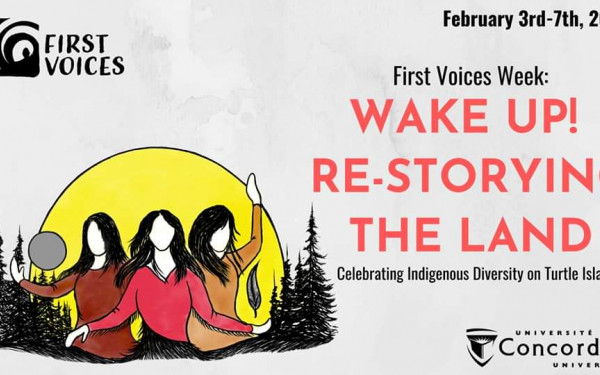First Nations Activists Weigh in on Canada’s Climate Battle
Talk Held at Concordia Opens Up Discussion on Resisting Climate Change
Resisting Climate Change, an event organized by Divest Concordia, Sustainable Concordia and the Concordia Student Union on Monday, Sept. 13, provided Indigenous youth organizers a platform on which to speak about protecting the land and how to be an ally to those fighting for it.
“The reason why we’re having this event is because we believe that Indigenous communities are the people doing the most important work and have been doing so for many years,” said Sustainable Concordia External and Campaigns Coordinator, Isabella Harned. “We’re creating this space to listen, learn and follow.”
Invited to speak were Vanessa Gray, Kiona Akodsera:ke Deer and Onroniateka Diabo. Gray is an Anishinaabe kwe grassroots organizer from the Aamjiwnaang First Nation who works to raise awareness around environmental racism. Deer and Diabo are Mohawk from the Kahnawake community and just recently got back from Standing Rock, where they were fighting in solidarity with the communities resisting the Dakota Access Pipeline.
Gray’s work is focused on the Chemical Valley in Sarnia, Ontario, which is home to 40 per cent of Canada’s chemical industry. 60 oil refineries and chemical plants surround her community, affecting the lives and well-being of the land, animals and people. Indigenous communities in the area are fighting big companies like Shell, Encore, Emperor Oil and Embridge.
She works with a group called Aamjiwnaang and Sarnia Against Pipelines to fight Enbridge’s Line 9, which starts in Sarnia and stretches to Montreal. The group took direct action, which resulted in the halt of the pipeline. “I am now facing charges up to 25 years for shutting down Line 9 in December,” she said.
“Line 9 connects me to you. This pipeline starts in my backyard, but it ends here. You and your drinking water are endangered by this pipeline, because of Enbridge and because of the National Energy board,” she explained. ”I was taught by my elders that you have a responsibility to your territory and to the nation you were born into,” she said.
Gray spoke about the sacred responsibility that Indigenous people have to fight for and protect the land. “It wasn’t a choice,” she said. She explained how different members of the communities have died, gotten sick and how the facilities seem to be growing and becoming more dangerous.
“If you live on this planet and eat food and drink water, it’s your issue. Even if it doesn’t hit you today, it’ll hit you tomorrow and it’ll hit your children and grandchildren” —Kiona Akodsera:ke Deer
Deer called on non-native allies and protectors of the land to get serious about their efforts and to support those who were putting their lives at risk. She spoke about how many people call Indigenous land rights movements radical, when in fact it is the destructive and violent actions of big corporations that should be considered extreme, not the other way around.
Kiona Akodsera:ke Deer and Onroniateka Diabo spoke about their experiences in Dakota, standing beside those fighting the Dakota Access Pipeline.
“It’s not only an issue for native communities. This is everybody’s issue,” said Deer. “If you live on this planet and eat food and drink water, it’s your issue. Even if it doesn’t hit you today, it’ll hit you tomorrow and it’ll hit your children and grandchildren.”
Deer spoke about the importance of understanding how protocol changes and works within different communities. Before visiting another territory, it’s necessary for people to understand how rules and traditions change, she said. Kahnawake takes their traditional protocol very seriously, as they have had a very difficult and sensitive relationship to outsiders, most recently evident in the 1990 Oka Crisis.
Diabo recalled some of his sacred experiences at Standing Rock. He had the opportunity to participate in ceremony, joining a men’s sweat, and singing and drumming throughout the night. He shared stories about people running through a field with a herd of buffalo running beside them, affirming their presence on the land.
Deer and Diabo spoke about the resilience and determination of the people involved in fighting the Dakota Access Pipeline.
“They don’t want the pipeline moved, they want it stopped and they will stay there until it is,” Deer explained. The Obama Administration and the Bureau of Interior Justice recently stated that they would consult further with the community and propose a new amendment.
Deer and Diabo are currently trying to find ways to go back to Standing Rock. They want to stand with the Lakota people in solidarity and called all allies to continue to share information about the climate struggle and to get directly involved.
Gray plans to continue to organize, educate and fight her charges. All panelists spoke about the necessity for allies to “defend the land defenders.”

_900_600.png)



__600_375_90_s_c1.jpg)
ED1(WEB)_600_375_90_s_c1.jpg)